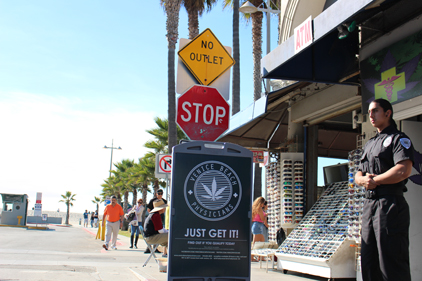
|
| Marijuana stores are strictly regulated and required by law to have extensive physical security systems, which make them a possible niche market for security companies. PHOTO COURTESY OF COLLECTIVE PROTECTIVE SERVICES |
Since recreational marijuana sales became legal in Colorado on January 1, 2014, the state has seen a number of break-ins and burglaries. Denver Police Chief Robert White reported that there had been seven burglaries at marijuana shops during the first 11 days of the year. While White added that the numbers are “relatively consistent with the number of burglaries we have in those businesses throughout the year,” local and national news have been reporting pot dispensaries and shops all over Colorado increasing or upgrading their existing security systems to fight off future invasions.
The legalization of recreational marijuana sales means more retail facilities opening up, which translates to potential business opportunities for security dealers and integrators, just as any retail or business growth would. However, in the case of pot shops, the stores are strictly regulated and are required by law to have extensive physical security systems, which make them a possible niche market for alarm companies.
At press time, 18 stores in Denver, and more than two dozen shops statewide, opened up for recreational sales on the New Year. Though the initial number may sound small, consider the fact that only businesses currently involved in the Colorado marijuana trade (also known as medical marijuana facilities) were the first ones to be able to open up recreational stores. Colorado will not allow those unaffiliated with a current marijuana business to open a facility until October 2014. The Denver Post reported that 160 licenses already have been applied for in the state.
Currently, marijuana dispensaries and shops are predominantly cash businesses, raising unique security concerns that must be addressed for the safety of the employees, customers and the business, though many are set up to take debit cards that do not require credit card processing. Banks have been hesitant to do business with marijuana businesses in the past, because it conflicted with federal banking regulations, opening them up to lose their charter or face prosecution for money laundering.
On February 17, 2014, however, the U.S. Department of Justice issued new rules that, for the first time, allow banks to provide financial services to state-licensed marijuana businesses. The issued memorandum given to prosecutors limits federal enforcement priorities.
The new rules don’t go as far as explicit legal authorization for banks, and therefore, because marijuana remains illegal under federal law, it is likely that some financial firms still will refuse to deal with marijuana businesses. It’s unclear at this time, just how much the government’s announcement will help.
For this reason, as well as for close regulation of sales and distribution, the state of Colorado has strict physical security requirements for retail marijuana shops. According to the Colorado Department of Revenue Marijuana Enforcement Division’s Permanent Rules Related to the Colorado Retail Marijuana Code, continuously monitored alarm systems installed by an “Alarm Installation Company” on all perimeter entry points and perimeter windows is required. In addition to alarm systems, retail marijuana establishments must have “a video surveillance and camera recording system in place.”
The detailed rules spell out specific placement of cameras, required camera coverage and lighting conditions, including cameras placed at cash register points so that they can record “the customer and employee facial features with sufficient clarity to determine identities.” And, that’s just state law.
“The municipalities have a lot more in-depth rules that we have to follow as well,” said Nick Speidell, head of security at The Green Solution, which owns two growing sites and four marijuana stores in Colorado. Speidell said The Green Solution goes above and beyond rules and codes, with upgraded physical security, including full-time security teams, squad cars and armored trucks — all owned internally.
Several companies specializing in dispensary security already exist, and they have made themselves experts in the strict laws that govern recreational shops and medical marijuana dispensaries.
Collective Protective Services of Chino, Calif., has been specializing in dispensary security since 2008, though it does offer security services to other businesses as well, according to KC Azubuike, president of the company. Collective Protective Services provided security to more than 100 dispensaries last year alone, including guard services, transportation security, and monitored surveillance systems.
“We have professional, armed and unarmed security guards trained specifically to secure marijuana collective facilities,” Azubuike said. “These are largely cash businesses, and it’s imperative to offer high security.”
Another company, Blue Line Protection Group, was formed late last year in Colorado to protect dispensaries and growing sites, as well as provide transportation security in the state. According to The New York Times, the company uses military veterans with Special Operations experience.
Just how much growth recreational marijuana shops will provide for security companies remains anyone’s guess. The number of shops that will actually open remains to be seen. However, in addition to Colorado, Washington State has legalized recreational sales as well, and storefronts are expected to open later in 2014.







